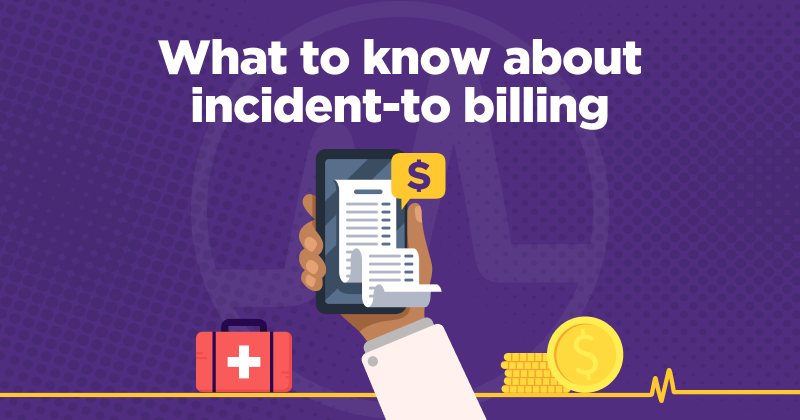Incident-to Billing: Navigating Medicare and Commercial Payer Guidelines

Learn some of the dos and don’ts of incident-to billing that can help your practice make better use of your nonphysician practitioners
Does your practice use incident-to billing? If so, you’re likely familiar with how challenging it can be to adhere to the many rules and regulations. However, practices that do not use incident-to billing might be overlooking opportunities to use nonphysician practitioners (NPPs) more efficiently and may potentially forgo revenue their practice is eligible for under payer rules. We’ve prepared a summary of this billing approach with ideas for how to implement incident-to billing at your practice.
What is incident-to billing?
Incident-to billing allows NPPs to provide follow-up services under the direction of a supervising physician and bill under the doctor’s national provider identifier (NPI) number, resulting in a greater Medicare reimbursement rate. Properly training your team about the ins and outs of incident-to billing can help your practice bill services in compliance with these complex regulations. Furthermore, proper training and understanding of guidelines for all payers may help mitigate the risk of audits, legal challenges or fines. By carefully adhering to incident-to guidelines and rules, follow-up services provided by a credentialed NPP can receive 100% of the physician fee schedule for Medicare as opposed to 85% reimbursement, which is the Medicare reimbursement rate when NPPs bill under their own NPI.
A tale of two incident-to billing scenarios
Let’s look at an example. An established Medicare patient experiencing acid reflux visits a gastroenterologist at her private practice. The doctor prescribes medication and schedules a follow-up visit in a week.
In Scenario A, the Medicare patient returns for the follow-up and is seen by a nurse practitioner, who is supervised and follows the care plan established by the practice’s gastroenterologist. The nurse practitioner records the patient’s progress, the absence of new complaints, and the supervising physician’s presence in the office suite. This visit may qualify for incident-to billing if all Medicare requirements are fulfilled, enabling the clinic to be reimbursed at 100% of the Medicare physician fee schedule.
In Scenario B, upon returning for the follow-up, the Medicare patient informs the nurse practitioner of a new complaint unrelated to acid reflux. The nurse practitioner, if qualified, can address the new complaint and outline a new treatment plan. However, incident-to billing cannot be used for this visit that addresses a new complaint. The clinic must bill Medicare under the nurse practitioner’s NPI, resulting in the clinic being eligible to collect 85% of the Medicare physician fee schedule.
Understanding incident-to Medicare guidelines
Knowing when and how to use incident-to billing with NPPs may help your practice better manage staffing and resources, especially when there is a shortage of physicians.
In order to bill a service as incident-to, the Centers for Medicare & Medicaid Services (CMS) has several requirements, including that:
- The supervising physician must have initially seen the patient and set up the treatment plan
- Only established patients seen by a credentialed NPP for a follow-up appointment can be billed as incident-to
- The supervising physician must be present in the office suite when services are being rendered by the NPP
- The supervising physician must actively participate in the course of treatment
- The medical services must take place in a noninstitutional setting (e.g., Place of Service 11)
- Both the NPP and the supervising physician must be credentialed by Medicare; and
- The NPP must be an employee of the supervising physician’s practice
Incident-to billing is not consistent with CMS rules if:
- The patient is new
- An established patient presents with new medical complaints
- Only one provider is credentialed by Medicare (e.g., the physician is credentialed but the NPP is not); or
- The supervising physician is not present in the office suite
In addition, Medicare Administrative Contractors (MACs), which process claims for Medicare in different parts of the country, may each have their own guidance and policies for incident-to billing that your practice should consider. For example, if your practice runs clinics in multiple states, each location must follow the applicable MAC guidelines for incident-to billing, which may require different documentation requirements.
Understanding incident-to billing documentation for commercial payers and Medicaid
Just as your practice should be aware of MAC-specific requirements in your region when it comes to incident-to billing for Medicare services, you should also review commercial payers’ rules regarding incident-to billing practices. For example, some commercial payers may prohibit incident-to billing under circumstances that Medicare might otherwise allow. Similarly, incident-to billing rules may vary under different state Medicaid rules.
How incident-to policies may vary by state and plan
Commercial payers and other non-Medicare payers may vary in their requirements that the NPP be credentialed by the payer. It’s essential that practices who bill using incident-to recognize and meet the specific requirements of each payer.
Integrating EHR and practice management systems to help streamline incident-to billing documentation
Distinction between clinical documentation and billing
ModMed’s EHR, EMA®, is designed to streamline clinical documentation and suggests codes based on a provider’s notes and choices. EMA suggests codes following national coding guidelines, so further refinement of a practice’s coding falls under the purview of its billing department. If the NPP is seeing a new patient, they would note directly in EMA that the primary provider (the NPP in this case) is also the billing provider for this visit and incident-to billing would not apply.
Why setting up incident-to billing processing matters
As a ModMed user, you can configure our Practice Management (PM) system to appropriately handle claims following documentation guidelines, including whether or not a specific payer allows incident-to billing. Your practice can also configure PM to initiate payer-specific scrub edits that comply with the insurer’s incident-to billing requirements. Setting up these configurations may help reduce errors and save time.
Getting the most out of compliant incident-to billing
Compliant incident-to billing allows practices to receive 100% of the Medicare physician fee schedule reimbursement rate for NPPs providing follow-up care to eligible patients. In contrast, billing for the same services under an NPP’s NPI is eligible for 85% reimbursement. As a result, when it is appropriate and compliant to do so, your practice can collect 15% more for a Medicare-eligible service billed as incident-to compared to a practice that does not employ this billing option.
Test your knowledge
Now that we’ve covered the fundamentals of incident-to billing, take a short quiz to test your understanding.
1. True or false? Incident-to billing can be used in a hospital setting.
False: Hospitals and long-term care facilities follow different shared/split services rules and do not allow incident-to billing.
2. True or false? A medical doctor not credentialed by CMS can bill under another doctor’s NPI using incident-to billing.
False: Medicare does not permit one physician to bill incident-to using another physician’s NPI. Incident-to billing is designed to allow NPPs to be an extension of the physician and see patients for follow-ups.
3. True or false? Practices can use incident-to billing for all services provided by nonphysician practitioners.
False: Practices must follow specific criteria and understand the rules for each case and payer.
4. True or false? Having a supervising doctor cosign a nonphysician practitioner’s note is always sufficient to use incident-to billing.
False: Regulations vary from payer to payer. With Medicare, for example, the supervising physician must be present at the clinic when the NPP renders services billable as incident-to.
5. True or false? All commercial payers follow CMS incident-to billing regulations.
False: Practices should confirm if their commercial payers allow incident-to billing and follow applicable payer rules.
Click here to watch our webinar on incident-to billing guidelines.
This blog is intended for informational purposes only and does not constitute legal, compliance, or medical advice. The rules and information discussed in this blog are subject to change, and ModMed does not make any representations or guarantees regarding accuracy. Please consult with your legal counsel and other qualified advisers to ensure compliance with applicable laws, regulations and standards.







